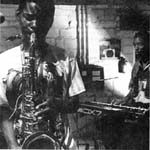 |
In the late `80s and `90s, the group Ghorwane became hugely popular with their Mozambican take on big-band, roots-driven Afropop. Started by Tchika Fernando in the midst of the country's civil war, Ghorwane used horns, guitars, percussion and strong vocal harmonies to adapt local rhythms--xigubu, mapiko, tufu and marabenta. The band was named for a small lake in the Gaza province, famous because no matter how dry the season, it never dries up. The lake is a symbol for the band's ethos of cultural survival, and during the difficult years of war, Ghorwane preserved roots culture with their music and raised spirits with their hopeful and sometimes politically charged lyrics.
In 1991, Ghorwane played at the WOMAD festival and recorded the album Majurugenta for Real World. Then at the height of their popularity in Mozambique, Ghorwane performed the music for a play called "Nambu, a Marrabenta Opera," which told the story of a farming family forced to come to the city during the war. The play featured 20 dancers and 10 musicians and remained a popular attraction in Maputo through the end of the war. Sadly the group's chief composer, Jose "Zeca" Alage, was murdered in 1993 by someone who wanted to steal his new shoes. Ghorwane's lineup had changed somewhat by the time they toured in Europe and recorded a second album, Kudumba, in 1996.
|
|